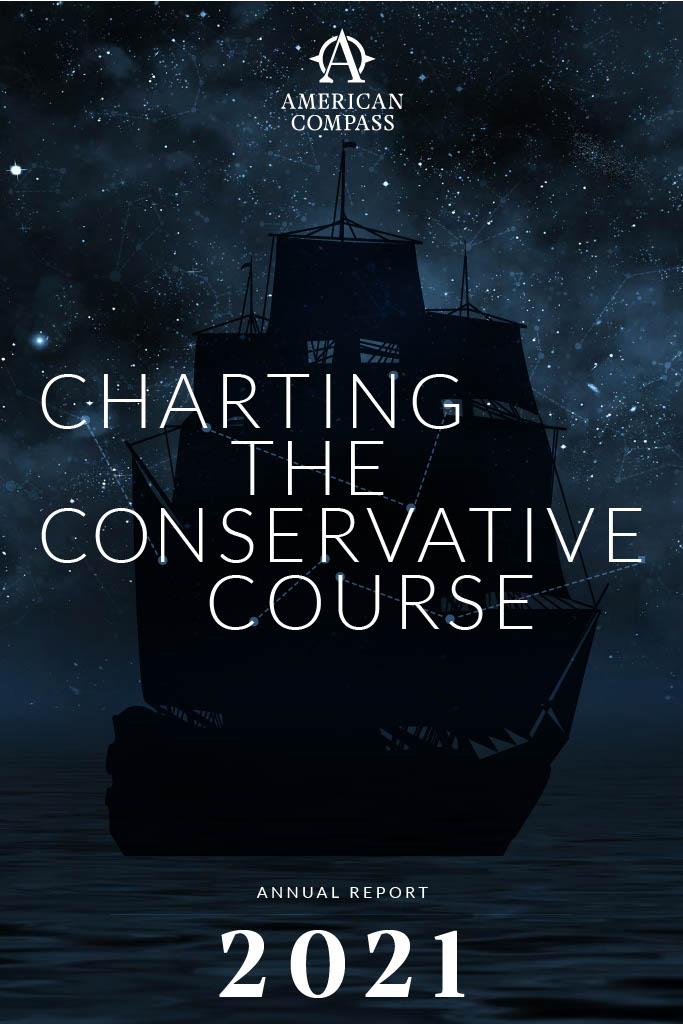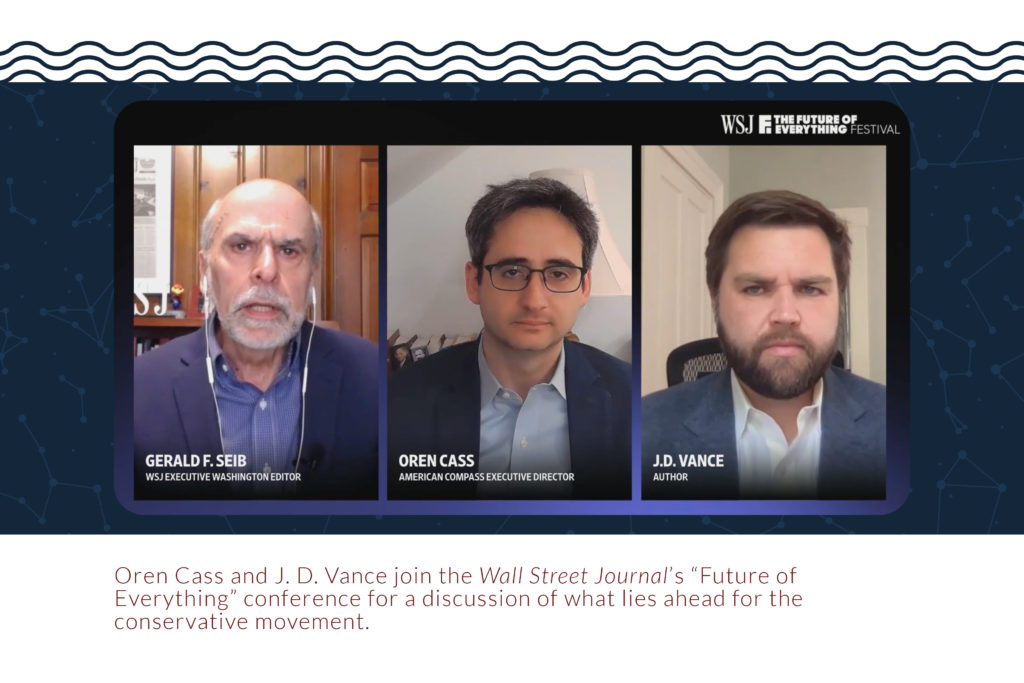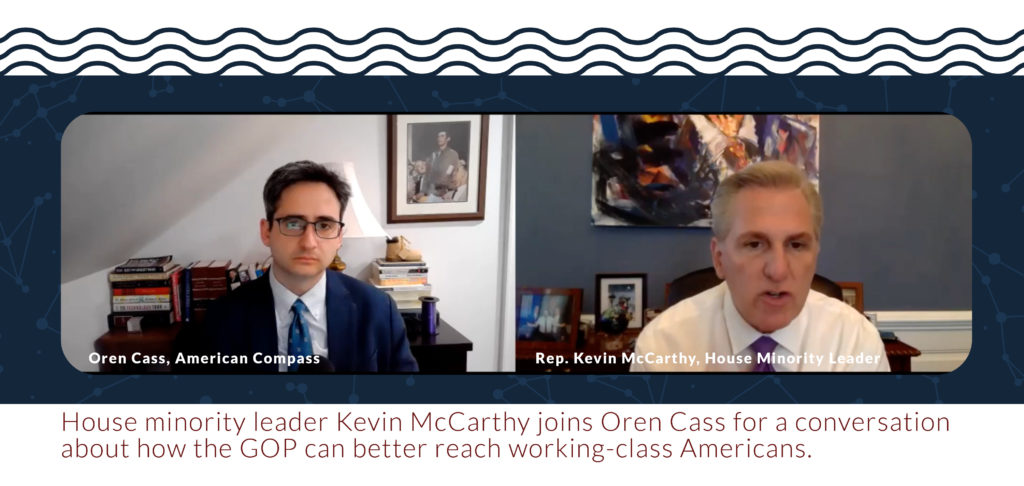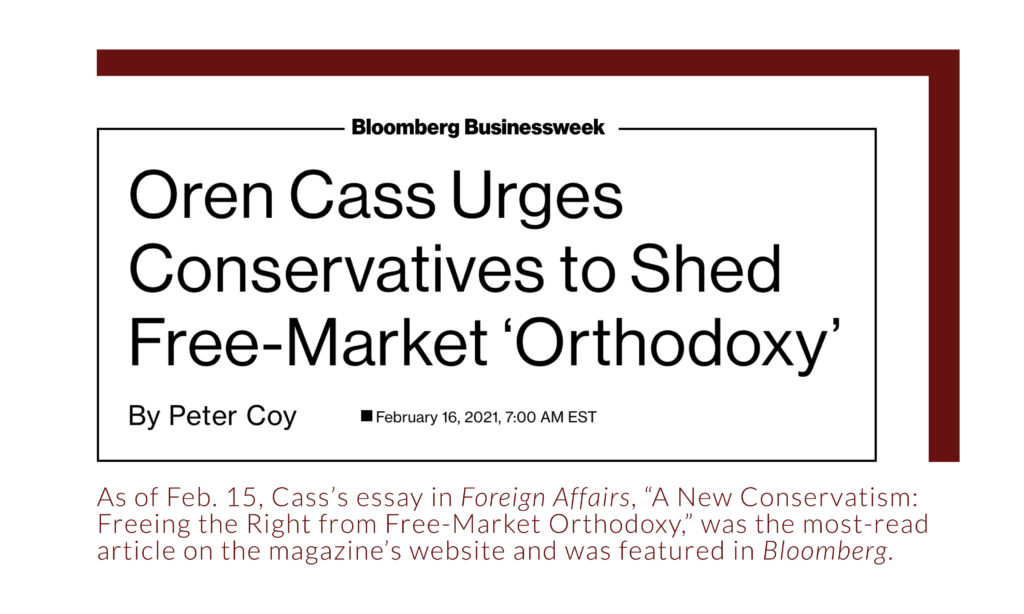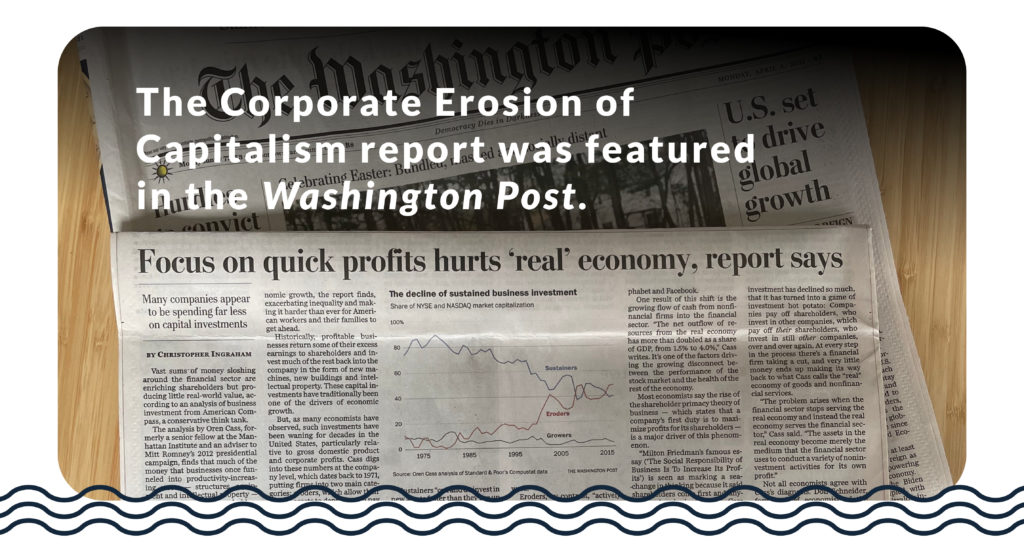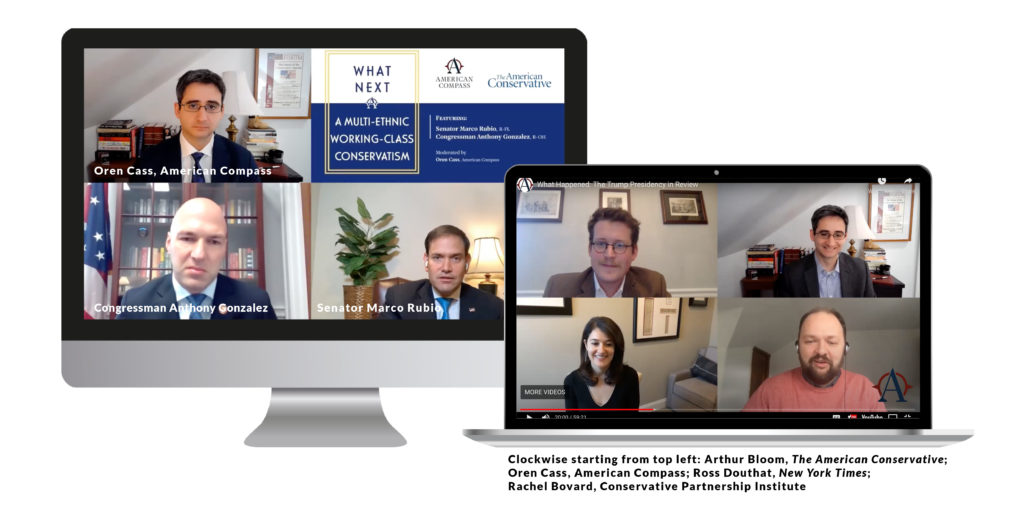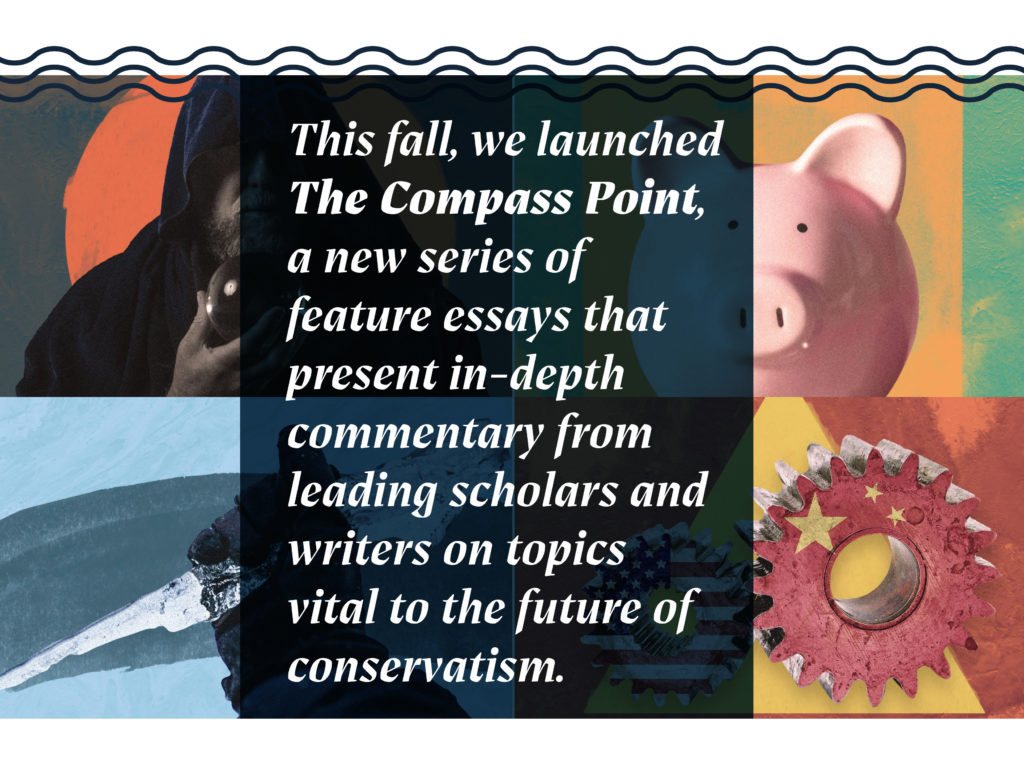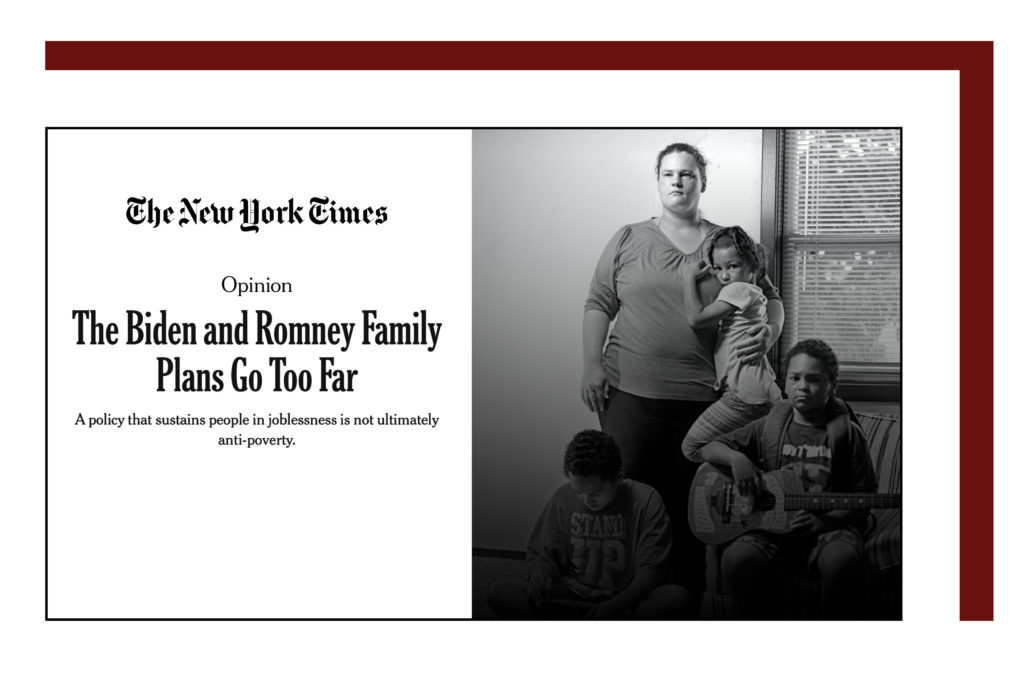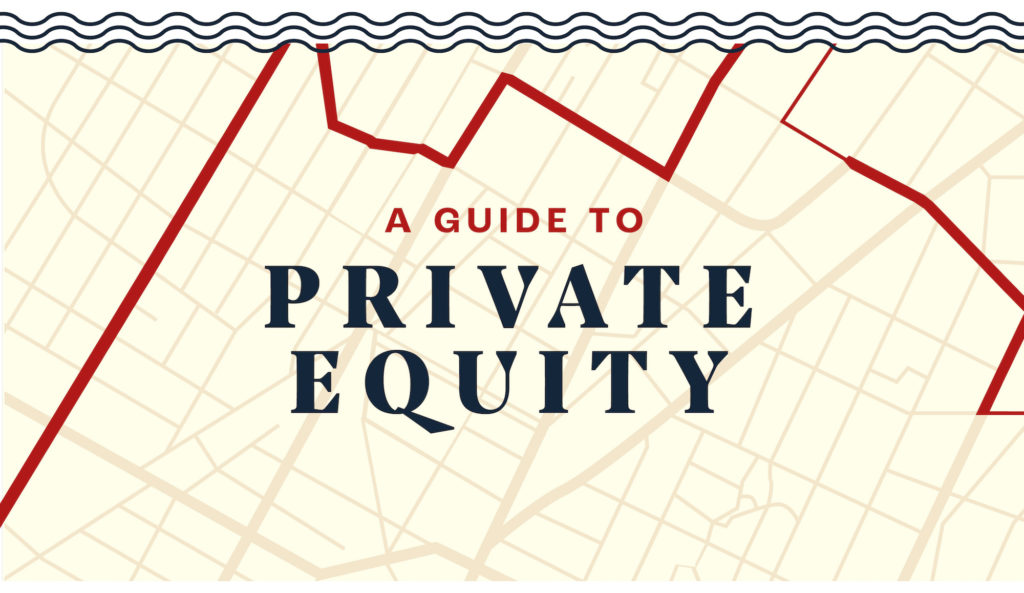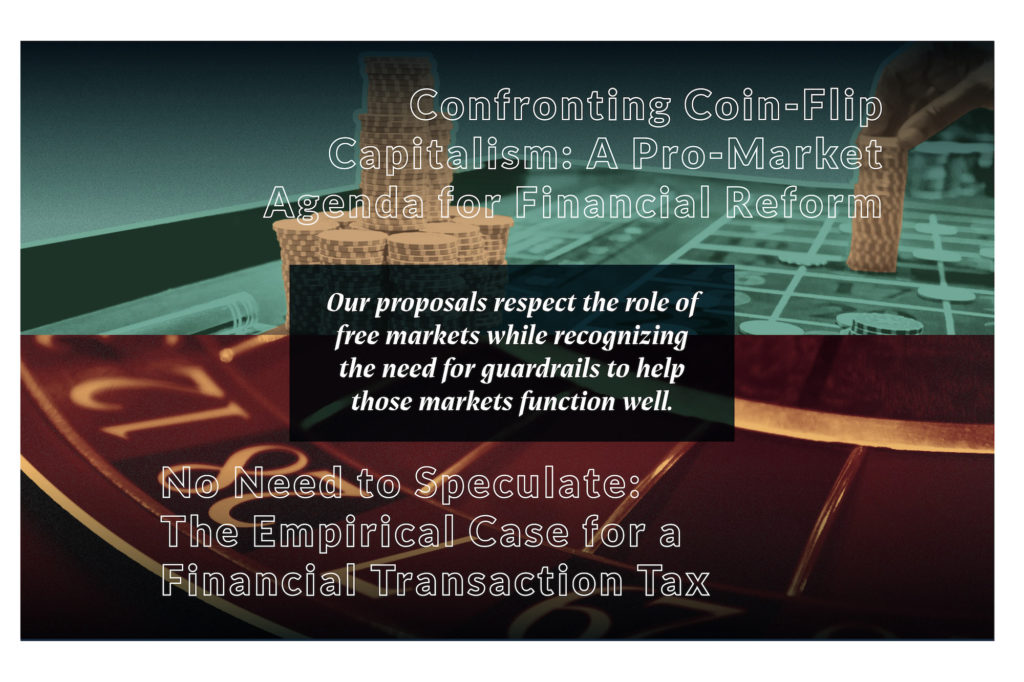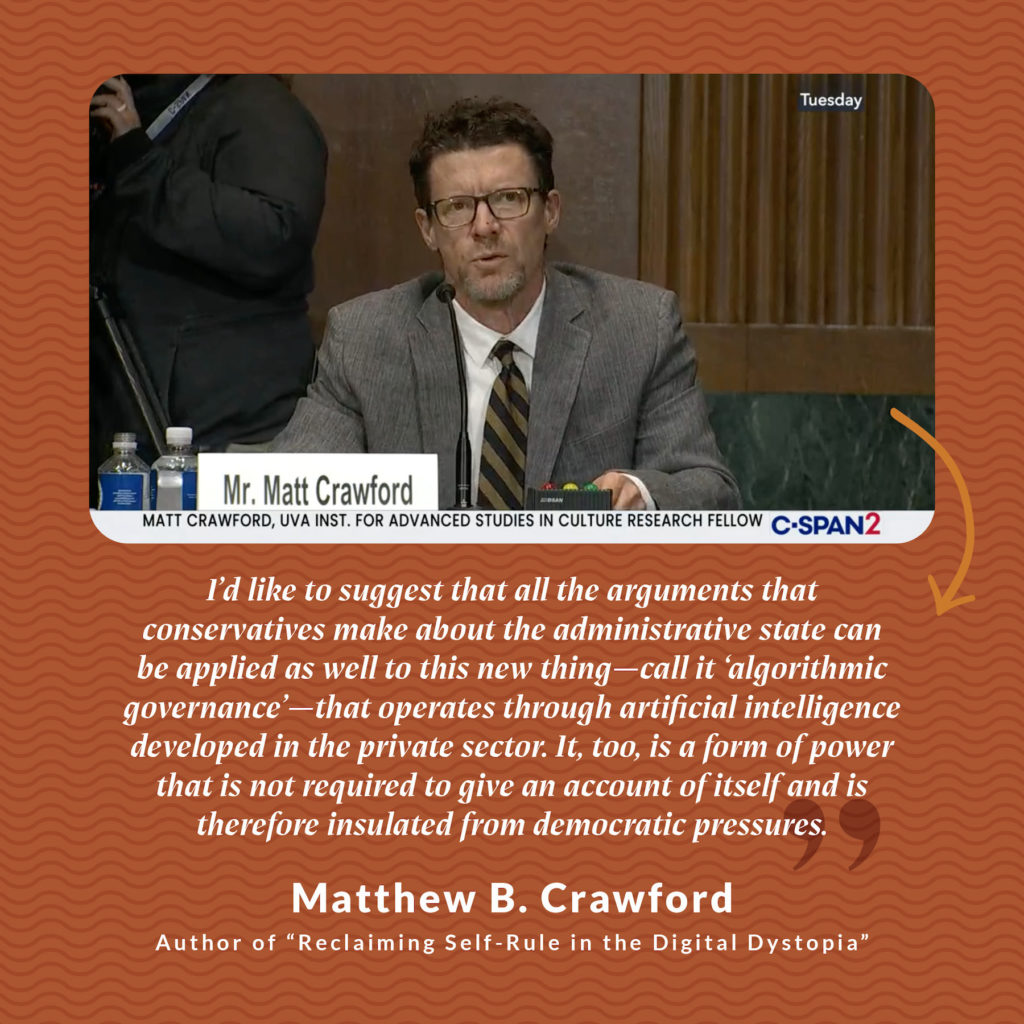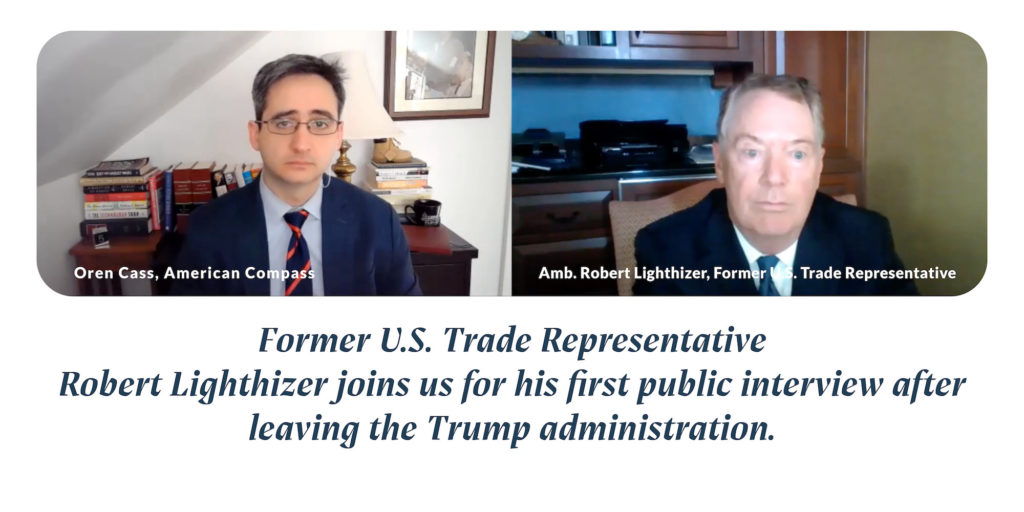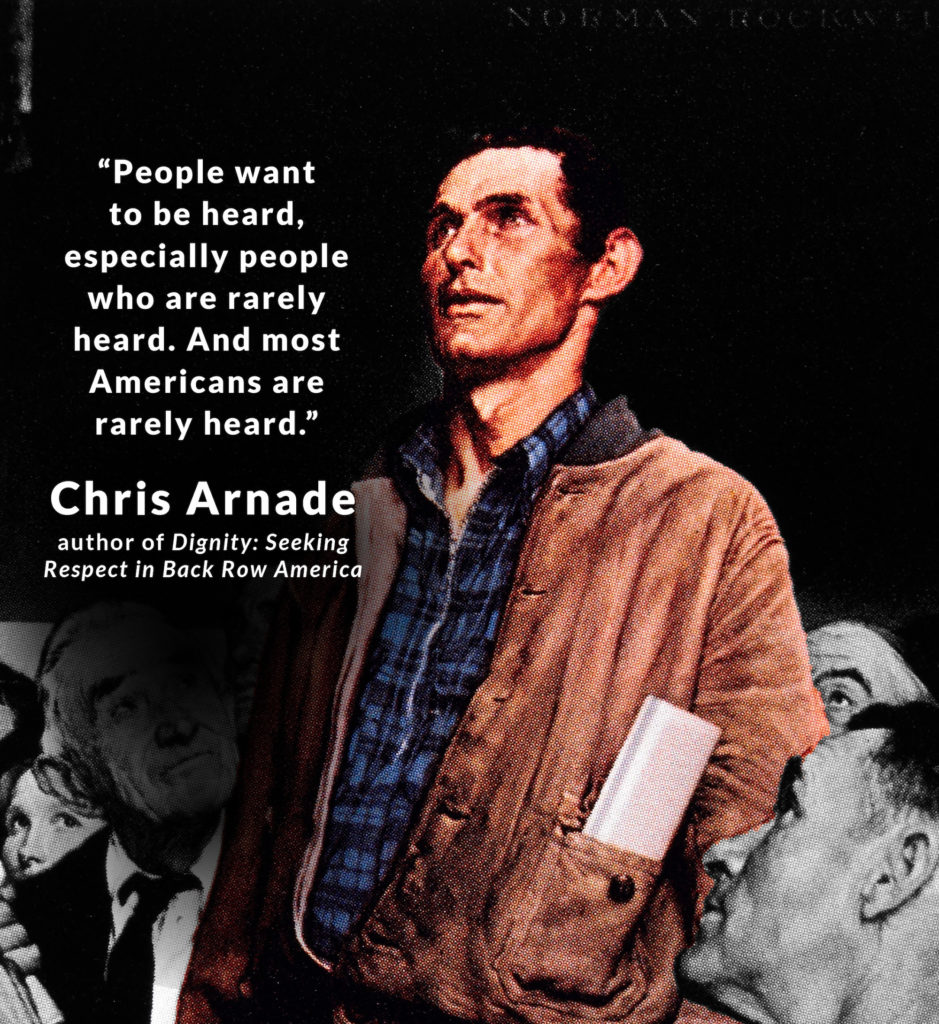
Founder’s Letter
By Oren Cass
I had the opportunity to kick off the Intercollegiate Studies Institute’s summer conference this year, addressing the question, “Which Way, American Political Economy?” The institute is one of the preeminent conveners of conservative debate; that it would even pose this question is an encouraging sign of the speed with which conservative economic thinking is shifting. American Compass has been a major catalyst for the shift, and our presence loomed large over the two-day gathering. Senate candidate J. D. Vance and former attorney general Jeff Sessions both addressed our work in their keynote remarks. Most panels featured at least two of our contributing writers. At one point, Washington Post political reporter David Weigel called it the “American Compass conference.”
Somewhat immodestly, I must say that I was an inspired choice for a political economy conference’s first presenter, having managed to actually major in political economy, which is fairly unusual. Not that a bachelor’s degree in much of anything makes one qualified in much of anything, but because most people have no idea what political economy is, those of us choosing to study it have to think long and hard about how to explain it—preferably in a pithy way suitable for Thanksgiving dinner.
Political economy, I always tell people, is political science without all the reading, and economics without all the math. Honestly, that’s what drew me to it—still draws me to it—and only partly because I was lazy. The definition says something important about why political economy is so useful: it has no time for theory.
Continue Reading the Founder’s Letter…
2021 Year in Review
This past year has laid bare the reality that motivated American Compass’s founding and animates our work every day: a viable post-Trump conservatism will look very different from the pre-Trump right-of-center, but its contours remain undefined.
In the 2020 election’s aftermath, the phrase “multiethnic, working-class conservatism” was suddenly on the tip of everyone’s tongue. “Can Republicans Become a Multiracial Working-Class Party?” asked The New Yorker. “The future of the party is based on a multiethnic, multiracial working class coalition,” answered Marco Rubio a few days later.
At American Compass, executive director Oren Cass wrote, two days after the election:
The idea of conservatives as the vindicator of workers’ interests may sound strange, but only because we have forgotten what conservatism means. The market fundamentalism that we call “conservative,” celebrating growth and markets without concern for their effects on family and community, and trusting that the invisible hand will invariably advance the interests of the nation, is libertarian. Conservatives are moving beyond it. And experience now suggests that, as they do, a broad-based, multi-ethnic coalition of working families could be eager to join them.
But he also observed:
Translating such concerns into a durable coalition and a governing agenda takes time, and an attention that Trump has not given it. Existing institutions like think tanks and publications must change their own approaches, or else new ones must develop. Political leaders and young staffers alike must decide whether the approach is for them. The actual work of policy development and implementation must occur.
The nation’s most prominent platforms recognize our role and feature us when focusing attention on the debates roiling the right-of-center. The Wall Street Journal partnered with us to host two events exploring the future of conservatism: first, a discussion between Oren Cass and George Will; and then a panel at the Journal’s “Future of Everything” conference, featuring Oren and J. D. Vance. Foreign Affairs invited Oren to contribute a feature essay on the future of conservatism, which received widespread acclaim. And when the Intercollegiate Studies Institute convened a major conference in Washington, “The Future of American Political Economy,” it invited Oren to give the opening remarks: “Which Way, American Political Economy?”
We have also begun to play a convening role ourselves. For instance, in December we partnered with The American Conservative to publish the first major symposium reflecting on the Trump administration, featuring live events with Senator Marco Rubio, Representative Anthony Gonzalez, New York Times columnist Ross Douthat, and the Conservative Partnership Institute’s Rachel Bovard. At the start of 2021, we launched Bearings, a regular meeting cochaired by ten other conservative organizations to host speakers for, and share notes among, the most engaged members of our coalition. We partnered with the Ethics and Public Policy Center to publish the Edgerton Essays, a series of essays from working-class Americans on the challenges they face and what they wish that policymakers knew about life far outside the Beltway. Establishment figures with whom we tend to disagree have been eager to join the conversation, too, from a live event in our 30 Minutes interview series with House minority leader Kevin McCarthy to a conversation on our Critics Corner podcast with Americans for Tax Reform president Grover Norquist.
In June, we expanded our board of directors to include former U.S. Trade Representative Robert Lighthizer, Baron Public Affairs’ Jonathan Baron, and Neil Patel of The Daily Caller. In July, we hosted our first annual members retreat, with nearly 50 people representing 26 organizations and publications, congressional and law offices, and academic institutions joining us for a weekend in Charlottesville. In September, we visited Texas to begin work with the Texas Public Policy Foundation on education reform in that state. In October, we announced a new grant program with American Affairs, through which we will seed other new organizations and projects working to reorient economic thinking in the U.S.
And, of course, we have continued to produce the original, provocative work that drives these discussions.
In February, we released our Home Building collection, a wide-ranging series of essays and policy proposals that provided the foundation and framework for a new generation of conservative family policy. We surveyed parenting-age Americans to learn more about the challenges that they face and the support that they need to build thriving families. Our Family Income Supplemental Credit (Fisc) proposal provided a breakthrough solution for reaching low-income families with generous support while maintaining a strong connection to work. Senator Mitt Romney joined us for a 30 Minutes event to discuss his own family benefit proposal and the future of conservative policymaking. The collection was widely cited, including in the New York Times, Wall Street Journal, New York magazine, Bloomberg, The American Conservative, and The Week.
As we had anticipated, the debate on family benefits continued gaining steam during the year, and in August we commissioned a follow-up survey to understand American attitudes on various proposals. Our findings informed the debate over the expanded Child Tax Credit, making appearances in the Washington Post and several New York Times columns on the need for careful compromise among policymakers—and the importance of tying benefits to work. We provided briefings on our research and proposals to the White House and a number of congressional offices focused on these issues.
In May, we placed the technology sector in our sights, looking beyond the battles over “Big Tech” to the deeper questions raised by the reshaping of our economy by social media’s attention economy, the labor market’s shift toward gig work, and the threat to privacy posed by all-knowing algorithms. Our Lost in the Super Market collection brought together a wide range of scholars to debate these novel issues and helped to start the broader conversation that policymakers need to hear. Our team has since written on the issue for the Financial Times and The Daily Caller; spoken at Baylor University, the Claremont Institute’s Digital Statecraft Summit, and the Lincoln Network’s Realignment Conference; and worked with numerous Hill offices and state-level officials who have sought our input as they consider policies to mitigate technology’s harmful effects.
While expanding our reach into new areas, we also dug deeper into those where we did groundbreaking work last year. In March, we returned to the themes of our initial Coin-Flip Capitalism collection and the question of what value the financial sector is producing for the broader economy. Using firm-level financial data dating back to 1970, Oren Cass showed that business investment has declined precipitously in recent decades, threatening the productivity growth and global competitiveness of American industry. These findings were highlighted by the Washington Post, Bloomberg, Fox News, the Financial Times, Senate testimony, and a member of the White House’s Council of Economic Advisers.
Building on the Seat at the Table collection, we returned in September to the need for a revitalized American labor movement. In A Better Bargain, we surveyed workers across the country about their attitudes toward their jobs and organized labor; their appetite for greater support, voice, and power in the workplace; and their reactions to political messages and policy reforms. We then proposed three Better Bargains to rebuild worker voice and representation, worker power in the labor market, and worker solidarity and mutual support. We brought this conversation to a large gathering of conservative leaders at the National Conservatism conference, where we convened a panel discussion with Sean McGarvey, president of North America’s Building Trades Unions, and Cardus’s Brian Dijkema.
A major conservative conference featuring a panel on the importance of worker power, with a union leader as an invited speaker, is just one example of how dramatically the national policy conversation has transformed in the 18 months since our launch. Initially, we were “dissidents” (The Economist), “a dagger thrust into the heart of the traditional center-right consensus” (Senator Pat Toomey), and even the subject of an attack ad released by the Wall Street Journal editorial page warning that we “sound an awful lot like Bernie Sanders.”
Not only are we now welcomed as vital participants in the debate over the right-of-center’s future; we are winning those debates and charting the conservative course.
* * *
“[A] stark ideological divide on economic issues is also emerging over how to chart a post-Trump future for the GOP. … The emergence of the new economic counterculture is loosely connected to the two-year-old think tank, American Compass.”
—POLITICO Magazine
* * *
“[T]he conservative media have heaped acclaim on Cass’ efforts and held him out as the future of the movement.”
—Reason Magazine
* * *
“The most closely attended- to conservative voice on this issue is Oren Cass, a former Mitt Romney adviser who heads American Compass. … Nearly all the Republicans loosely aligning themselves with working-class interests listen to Cass.”
—Christopher Caldwell in The New Republic
* * *
“American Compass represents the most intellectually honest tendency within the anti-Establishment right. … It’s arguing with exquisite politeness that upholding conservative values requires giving labor more power over capital.”
—New York Magazine
Rescuing Conservatism
The 2016 election made clear what astute analysts had already been predicting for some time: American politics would undergo a realignment. The so-called fusionism that characterized the right-of-center and provided the Republican Party’s coalition—economic libertarians, social conservatives, and Cold War hawks—had passed its expiration date. The coalition members no longer agreed on how to address contemporary challenges, and their stale agenda was unresponsive to the concerns of middle- and working-class Americans.
President Donald Trump marked an obvious break with the past but provided little foundation for the future. In the aftermath of the 2020 election, we partnered with The American Conservative to reflect on the previous four years in the first comprehensive review of the Trump presidency. In essays covering personnel, politics, and policy, contributors Rachel Bovard (Conservative Partnership Institute), Julius Krein (American Affairs), Daniel McCarthy (Modern Age), and our own Oren Cass and Wells King considered what lessons conservatives should learn. To discuss these issues in more depth, we hosted two live events: “What Happened,” with New York Times columnist Ross Douthat; and “What Next,” with Senator Marco Rubio and Representative Anthony Gonzalez.
Recognizing our role as the flagship for efforts to forge a post-Trump conservatism, the Wall Street Journal also partnered with us for a series of live events: one in which Oren Cass and longtime political commentator George Will shared their starkly different understandings of and aspirations for conservatism; and another at the Journal’s popular “Future of Everything” conference, where executive Washington editor Gerald Seib interviewed Oren Cass and Hillbilly Elegy author J. D. Vance. Later in the spring, House minority leader Kevin McCarthy joined us for a discussion of how the GOP is shifting to embrace a truly working-class coalition.
That shift seems to be having a real effect: when Senator Rubio spoke to the Republican Study Committee about the need to challenge “the orthodoxy that the market’s always right,” the Washington Examiner reported that it was “one of the clearest signs yet of the Republican Party shifting ideologically away from free-market evangelism. … So many members … attended the event that they ran out of food.” In a striking October column in the Wall Street Journal, former editor-in-chief Gerard Baker dismissed Reaganism because “the complex challenges the country faces today won’t be fixed by big tax cuts and deregulation” and called instead for the GOP to follow the trail that American Compass has been blazing, one that “addresses the dystopia in modern American life, elevates the family and traditional values, resists the advance of cultural nihilism, and rejects the pure neoliberal market economics that has in some way exacerbated the crisis.”
Even those who disagree with us most strongly have acknowledged our leading role and the success that we are having. As Stephanie Slade noted in Reason magazine, “the conservative media have heaped acclaim on Cass’ efforts and held him out as the future of the movement.” On the left, Eric Levitz wrote in New York magazine that “American Compass represents the most intellectually honest tendency within the anti-Establishment right. … [T]he think tank takes the GOP Establishment to task for its actual, material betrayals of the party faithful. It packages this dissent in policy papers, not Twitter tantrums. … It’s arguing with exquisite politeness that upholding conservative values requires giving labor more power over capital.”
Conservative Economics
A realigned conservatism must be built on a coherent and compelling intellectual framework, not mere political opportunism. Thus, our mission is to restore an economic consensus that emphasizes the importance of family, community, and industry to the nation’s liberty and prosperity. This year, as the right-of-center contemplates its path forward, American Compass has emerged as the leader in scrutinizing the outdated orthodoxy and developing genuinely conservative economic thinking. In The New Republic, the Claremont Institute’s Christopher Caldwell described Oren Cass as “the most closely attended-to conservative voice,” writing that “[n]early all the Republicans loosely aligning themselves with working-class interests listen to Cass, and it’s partly because he has a theory about the economic history of this century and how it led to our present predicament.”
Reassessing that economic history is the thrust of the essay that Oren wrote to lead off Modern Age’s symposium on the humane economy, in which he asks, “Are you better off than you were 40 years ago?”

Questions like these have inspired a profound reconsideration of many economic ideas long accepted as gospel on the right. In the Claremont Review of Books, Oren explored the “self-defeating libertarianism” of so-called public choice theory. Then Foreign Affairs invited him to contribute a feature essay describing the current political moment and the contours of a conservatism that moves beyond free-market fundamentalism. Bloomberg Businessweek featured the essay’s arguments, highlighting that in mid-February, it “was the most-read article on the magazine’s website.” In First Things, Wells King provided a conservative assessment of “degrowth” economics, discussing the need to consider the moral and ecological requirements of a well-functioning political economy.
Our work has also emphasized the issue of economic inequality, long avoided on the right but unavoidable in any serious conversation of America’s economic woes. In “We’re Just Speculating Here…,” Oren Cass showed how investment congealing on Wall Street rather than flowing into the real economy has inflated asset values, driving massive wealth gains for the already rich while yielding little gain for the typical household. For our Atlas series, we produced a comprehensive overview of research on the issue, prompting discussion everywhere from The Dispatch to America magazine. In The Daily Caller, research director Wells King explained why conservatives should focus on this issue and prioritize “building an economy that provides real economic opportunity for everyone.”
Our approach to economics is “gaining power,” noted Politico in its magazine feature “A Big Policy Fight Is Brewing on the Right. And It’s Not All About Trump.” We are catalyzing a “new economic counterculture,” reported Washington Free Beacon editor-in-chief Eliana Johnson, that is giving rise to “common good capitalists.” In a conversation with Oren Cass for Politico’s Playbook Deep Dive Podcast, Johnson noted: “The challenge is, and what American Compass and Oren Cass … are doing is taking those broad principles and saying, ‘What does it mean as a policy?’ ”
Every day, the American Compass team works to strengthen the persuasive power of our arguments and bring them to more people on more platforms. This year, we published more than 25 op-eds and essays in a wide variety of outlets, including the New York Times, the Financial Times, Foreign Affairs, and Politico.
We made more than 50 public presentations, from speeches at national conferences to classroom lectures at leading universities. And we held more than 60 meetings with policymakers and staff in the White House and on Capitol Hill, across both political parties and both houses of Congress, on issues from education and family benefits to industrial policy and labor reform.
Building Bridges
Described as “dissidents” when we launched, American Compass has quickly established itself as the flagship for innovative policy thinking on the right-of-center and become an integral member of the broader conservative coalition. This year, we introduced Bearings, a regular meeting of leaders from Capitol Hill, nonprofit organizations, academia, and media. The group now boasts nearly a dozen cochairs: American Affairs, The American Conservative, American Principles Project, American Greatness, Claremont Institute, Conservative Partnership Institute, Edmund Burke Foundation, Ethics and Public Policy Center, First Things, Intercollegiate Studies Institute, and Public Discourse.
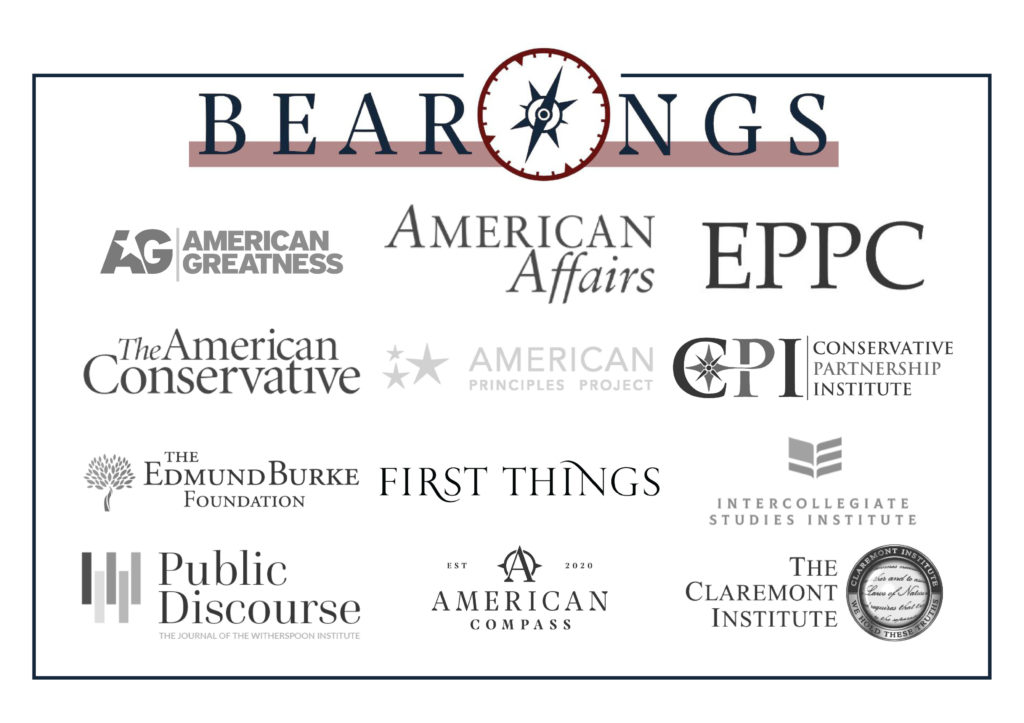
We have sought out partners for some of our major projects this year. We copublished the first retrospective on the Trump presidency with The American Conservative and cohosted two live events looking back at the administration’s successes and failures and ahead to what might come next for conservatism. We published the Edgerton Essays, our collection of perspectives from working-class Americans, in partnership with the Ethics and Public Policy Center. When we commissioned a survey on Americans’ family policy preferences, we shared the resulting data with the Institute for Family Studies so that it could conduct additional analysis in a report on the family policy attitudes of working-class Americans. Looking ahead, we are excited to partner with American Affairs on a new grant program to support innovative work in conservative economics.
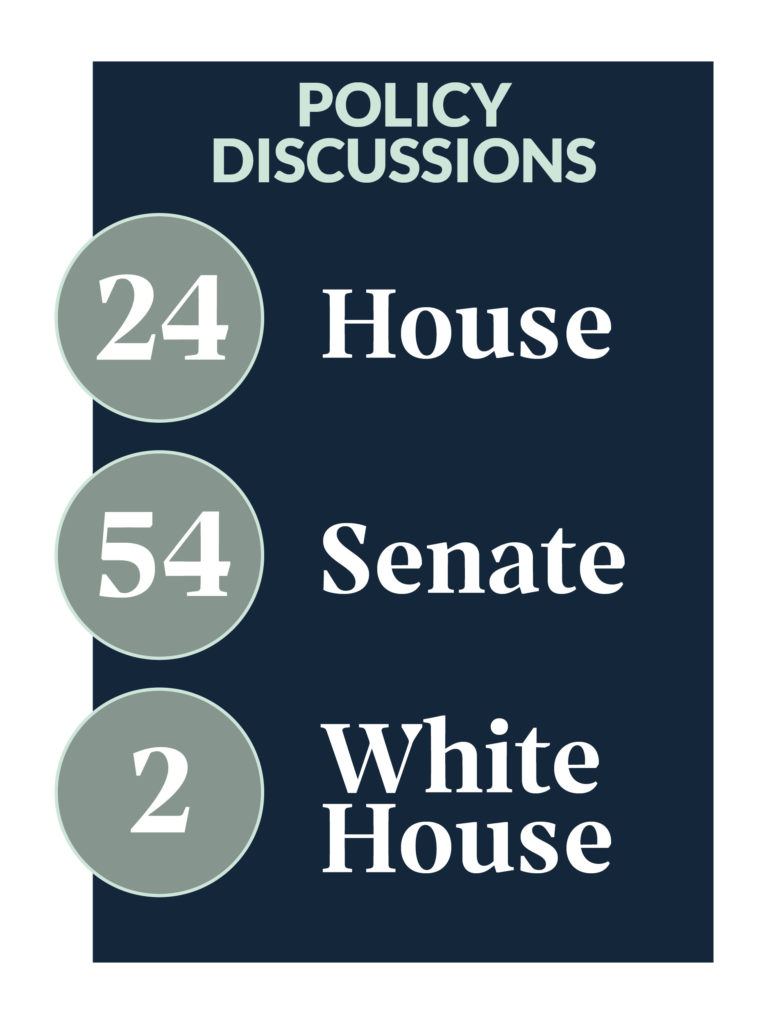
Many organizations have likewise turned to us as an ideal collaborator on their own initiatives. The Wall Street Journal worked with us to cohost two events on the future of conservatism, including one at its popular “Future of Everything” conference. The Texas Public Policy Foundation invited our team down to its state for meetings to kick off an initiative on innovative reforms for education and workforce development. The National Conservatism conference invited us to plan a session that would challenge conventional economic thinking, which we did with our panel on worker power.
And we have been delighted by the degree to which universities have engaged with our work and sought to bring this fresh thinking into the conversation on college campuses. Oren Cass has taught classes at Notre Dame Business School (on corporate governance), Baylor University (on technology regulation), and Cornell University (on inequality). He also delivered lectures at Georgetown University, University of Virginia, Harvard University, Claremont McKenna, Duke University, New York University, and Yale University, and was honored to give the annual Brooks Family Lecture at Dartmouth College. Wells King spoke at UCLA and the University of Maryland.
Family Policy
Conservatives have long sounded the alarm about the collapse of the American family, but they have also been short on responses. The issue of family policy rose to the forefront of political debates this year when the Biden administration’s American Recovery Plan expanded the Child Tax Credit for one year and made it unconditional, eliminating any requirement that a member of the family be working.
Just as the debate shifted into high gear in February, with Senator Mitt Romney offering a competing proposal of his own, we released our most ambitious collection to date, Home Building, which featured a groundbreaking public opinion survey, nine essays from prominent scholars, a series of seven family-friendly policy ideas, and our own comprehensive proposal for a Family Income Supplemental Credit (Fisc)—the first policy framework to provide generous support to working families at all income levels while still emphasizing the importance of work.
The Fisc quickly became central to the family policy debate. Oren Cass made the case for a work-centric benefit in the New York Times, while the Wall Street Journal reported on the proposal alongside ones from Senators Romney and Rubio. When Senator Josh Hawley introduced a proposal of his own, it followed the Fisc’s contours closely. We further advanced the debate by hosting Senator Romney for a conversation about his proposal, convening a debate between the Niskanen Center’s Samuel Hammond and the American Enterprise Institute’s Scott Winship, and publishing commentary on the Fisc from nine other scholars at institutions ranging from the Manhattan Institute to the American Enterprise Institute.

Our survey results flipped the script by being the first to break down family policy and child-care preferences by class, showing how working-class voices were consistently left out of the debate. “Why didn’t anyone else think to do this?” asked Tucker Carlson, when he interviewed Oren Cass on Fox News. Our findings were cited widely, including by Hillbilly Elegy author J. D. Vance, whose tweets about it went viral as one of the day’s trending topics.
Anticipating that Congress would return in the fall to the question of whether the one-year Child Tax Credit expansion should be made permanent, we commissioned a survey about Americans’ attitudes toward the policy and various alternatives under consideration. Just as attention turned in that direction, with Congress splintering over the Biden administration’s “Build Back Better” proposal, we released the striking results: while Americans had supported the one-year plan, which many saw as an extension of COVID-19 relief, they opposed making the unconditional cash benefit permanent. At the same time, most voters—including most Republican voters—considered the standard GOP position too stingy. What the median voter preferred, and the option most popular among independents as well as the working class, was something akin to the American Compass Fisc: a benefit generous to households with very low incomes but still contingent on some earnings of the family’s own. This perspective had been missing from other analyses and polling that assumed a binary debate between universal cash transfers and small tax credits, and commentators in both the New York Times and the Washington Post have highlighted our findings. The congressional offices that are focused on the issue have taken a keen interest, too—we’ve had more than a dozen meetings with staff and members seeking to better understand how American values and preferences could shape a family policy with the prospect for durable, bipartisan support.
Financial Capitalism
Our ongoing work on Coin-Flip Capitalism has shone a spotlight on the problem of financialization in the American economy, earned widespread coverage in the financial press, and drawn intense interest and concern from the private-equity and hedge-fund industries. “The real economy now serves the financial sector, instead of vice versa,” warned Oren Cass in the Financial Times in March. “Investment shortfalls and overheated financial markets have contributed to stagnant productivity and wages, declining international competitiveness and rising wealth inequality.” We deepened this work on two fronts this year, with the publication of compelling original research on long-term investment trends and an in-depth series of policy papers.
In our report, “The Corporate Erosion of Capitalism,” we analyzed nearly 50 years of firm-level financial data to demonstrate a fundamental shift in the nature of American capitalism. Whereas the overwhelming majority of publicly traded firms were once “Sustainers” that made sufficient capital investments each year to maintain or grow their capital bases, they are now surpassed by “Eroders” that are sufficiently profitable to do the same but choose instead to consume their capital base faster than they reinvest and disgorge more cash to shareholders. An accompanying essay, “We’re Just Speculating Here…,” placed this trend in the context of financialization and broad confusion between the now-prevalent “non-investment” of speculative trading and the declining art of “actual investment” in the real economy’s productive assets. The research was featured in the Washington Post, Bloomberg, and the Financial Times; on Fox News’ Tucker Carlson Tonight and The Hill’s Rising; and in Senate testimony by Americans for Financial Reform.
To help explain the role of private equity in the American economy—specifically, its poor performance and increasing risk—to the average reader unfamiliar with EBITDA and foreign direct investment, we published a step-by-step Atlas of the data. “[Private equity] firms eager to justify their existence are placing ever-riskier bets at ever-higher prices. … This is unlikely to end well, either for their investors (often the taxpayers behind public pension funds) or workers at the targeted companies. The PE firms, of course, will still collect their fees.”
The question remains: What to do about it? In “Confronting Coin-Flip Capitalism,” we explored how conservative principles could inform effective, pro-market financial reform. Until now, both the left and the right have lacked proposals that respect the role of free markets while recognizing that those markets need constraints and guardrails to function well. In complementary white papers, Oren Cass and policy director Chris Griswold presented a series of reforms that would create new obligations to workers in bankruptcy, increase private fund transparency, ban stock buybacks, and impose a financial transaction tax.
Technology
The role of technology—and the role of government in regulating it—has come to the forefront of the national conversation, with Facebook under fire for its effect on children, Amazon for its treatment of workers, and Twitter for its censorship of disfavored speech. These debates often lack clarity, largely because policymakers accustomed to consulting their 1980s playbooks cannot possibly find the answers there. The digital revolution is as profound as the Industrial Revolution of two centuries ago, fundamentally changing how we relate to one another, how markets function, and how much power corporations can wield.
Our June collection, Lost in the Super Market: Navigating the Digital Age, tackled these questions head-on, making the case that policymakers must consider the fundamental transformation underway in our society, rather than understanding the issue as merely “Big Tech” or “Section 230.” Just as the Industrial Revolution prompted entirely new roles for the state and forms of regulation, we will need new policy approaches tailored to the novel problems created by the digital “super market.” We convened leading scholars to present opposing views on three facets of the super market and its consequences: frictionless exchange, the attention economy, and all-knowing algorithms.
The University of Virginia’s Matthew Crawford, who addressed the dangers of the attention economy in our collection, adapted his essay into testimony before the U.S. Senate Judiciary Subcommittee on Competition Policy, Antitrust, and Consumer Rights. The collection prompted broad consideration and debate, including in the Financial Times, The Daily Caller, Newsweek, and The American Conservative. We also hosted a salon dinner with some of the collection’s writers and our members to discuss the issues raised and potential policy solutions.
Looking more deeply into digital technology’s implications for regional inequality and labor rights, we hosted an event with Alec MacGillis, author of Fulfillment: Winning and Losing in One-Click America, which examines the effects of Amazon’s growth on life in struggling regions across America. At the Claremont Institute’s Digital Statecraft Summit, research director Wells King joined a panel discussion on technology policy, where he highlighted the novel challenges presented by our new digital age.
Industry
The past few years have witnessed a sea change in American debates about trade and industrial policy. The naïve view that China’s ascension to the World Trade Organization would lead inevitably toward greater freedom and open markets has been badly discredited, and many people pretend never to have held it. A more realistic approach, long championed by former U.S. Trade Representative Robert Lighthizer, now prevails. In January, Ambassador Lighthizer joined us for his first public interview after leaving the Trump administration to discuss trade policy, U.S.–China relations, and our overreliance on foreign producers.
All Americans discovered the importance of supply chains this year, and one in particular has been the focus of attention in both industry and government: semiconductors. The U.S. developed this technology and its commercial industry, vital to everything from cars to computers; but in recent decades, we forfeited our leadership to foreign corporations and nations. The American Compass Atlas on the semiconductor industry shows in detail how public subsidies for national champions like Taiwan’s TSMC and South Korea’s Samsung allowed those firms to lap U.S. producers like Intel, which suffered from both public and private underinvestment. Our research, published in National Review and featured in Time magazine’s coverage of the issue, made the case for federal adoption of an industrial policy that could restore American leadership.
A bipartisan consensus is beginning to emerge around ideas like these, and, encouragingly, conservatives are often leading the way. Both the CHIPS Act and the Endless Frontiers Act represent positive steps toward public investment in vital sectors (the former was passed into law in January; the latter has passed the Senate as the United States Innovation and Competition Act). This fall, Senator Josh Hawley and Representative Claudia Tenney took another step forward, proposing adoption of Local Content Requirements for vital supply chains along the lines proposed in our Moving the Chains symposium last year. We meet regularly with congressional staff and members interested in better understanding the challenge posed to American industry by antimarket policies in countries like China and the options for a policy response. Oren Cass briefed the elected officials and private-sector leaders of the Reagan Institute’s Task Force on National Security and U.S. Manufacturing Competitiveness, alongside the CEOs of GlobalFoundries and NXP Semiconductors.
We continue to lead the public conversation as well, with Oren engaging in debates at the Soho Forum, the Charles Koch Institute, and the Congressional Institute. Policy director Chris Griswold participated in the Federation of American Scientists’ Day One Project roundtable series on industrial policy this fall, alongside representatives from the White House National Economic Council, Massachusetts Institute of Technology, and Department of Health and Human Services, among others.
Labor Reform
All eyes turned to Bessemer, Alabama, this spring as the Retail, Wholesale and Department Store Union attempted to organize workers in an Amazon warehouse. The effort failed miserably, confirming and calling attention to the argument that we first made in last year’s Seat at the Table collection: American workers need greater power in the labor market and representation in the workplace, but they aren’t buying what Big Labor is selling. In an essay for Politico, Oren Cass explained: “Workers have shown that they dislike the hyper-adversarialism and political activism that American unions bring into their workplaces but are eager for more representation, voice, and support than they can achieve individually. What they want, and need, is a middle ground that neither side is offering.”
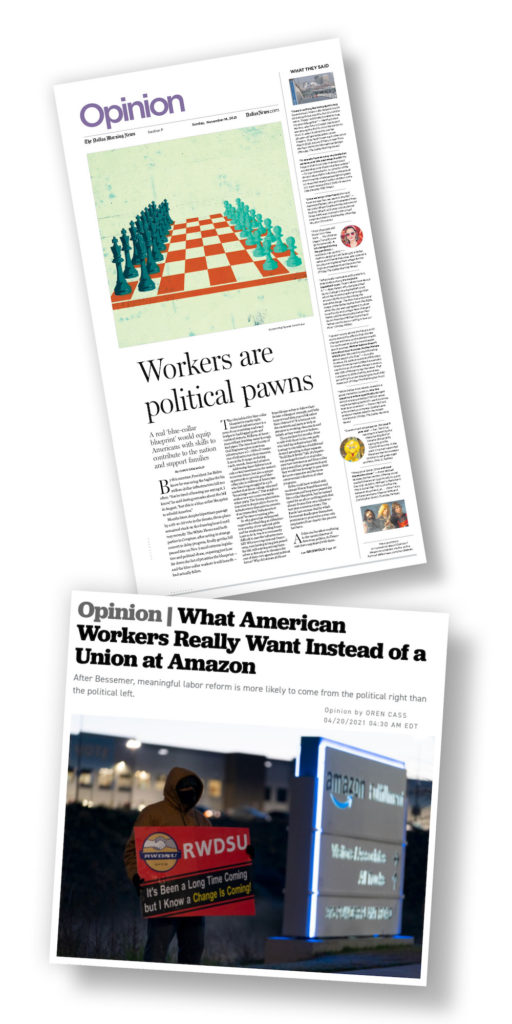
We sought that middle ground in A Better Bargain, our September collection on concrete labor reforms that would represent compromise by Big Labor and Big Business for the benefit of workers. The collection began with a major survey of worker attitudes, “Not What They Bargained For,” which found that while workers want a collective voice in the workplace, they dislike the politicization and conflict that today’s unions emphasize. With these results in mind, we presented three Better Bargains that could better meet workers’ needs: providing worker representation through works councils and on corporate boards; facilitating broad-based collective bargaining agreements that can depart from federal regulatory standards; and shifting unions away from political spending and toward provision of training and benefits.
When we started the conversation about a conservative future for America’s labor movement last year, many people were bewildered. But our work has been steadily shifting the debate. The U.S. Chamber of Commerce hosted Oren Cass for a debate on the issue, the HR Policy Institute hosted Oren and former SEIU president Andy Stern for a discussion, and the Labor Employment Relations Association hosted Oren and AFL-CIO policy director Damon Silvers for a plenary session at its annual conference. Federalist Society chapters at Harvard, Yale, and Columbia have hosted events to consider the conservative case for organized labor. Most remarkably, this year’s National Conservatism conference featured a panel titled “Worker Power” with Oren, Brian Dijkema of Cardus, and North America’s Building Trades Unions president Sean McGarvey.
These discussions are winning converts. At The American Conservative, contributing editor Sohrab Ahmari and managing editor Micah Meadowcroft have both written in favor of greater worker power through collective bargaining. Senator Marco Rubio made waves by endorsing the organizing effort at Amazon and has cited our Better Bargain survey in support of new legislation that he introduced on corporate governance. At The Federalist, culture editor Emily Jashinsky observed on Labor Day that “some conservatives may sincerely be unfamiliar with the legitimate need that some workers have … for more robust representation and for a more robust labor movement.”
The Edgerton Essays
Today’s public square is too often closed to those without a narrow set of credentials. Politicians and pundits in Washington are consumed with ideological battles far removed from the day-to-day concerns of American workers and their families and often seem incapable of even understanding them. Our policy debates are poorer for it, our policymakers less informed, and our fellow citizens excluded.
We launched the Edgerton Essays this year to feature working-class Americans sharing their perspectives on what they wish policymakers knew about the challenges facing their families and communities. The Edgerton Essays are named for Norman Rockwell’s famous 1943 painting Freedom of Speech: Rockwell depicted Jim Edgerton, a farmer in his small town, rising to speak and being respectfully listened to by his neighbors. That respectful, democratic spirit is too often missing today and is what we hoped to cultivate with the series.
We are proud to have partnered with the Ethics and Public Policy Center to publish more than 20 Edgerton Essays this year by a truly diverse array of contributors from across the country. These essays show just how far the average American’s political views diverge from the partisan divide that defines most D.C. debates. This summer, we compiled the essays into a printed anthology, featuring reflections from Chris Arnade, author of Dignity: Seeking Respect in Back Row America; Victor Davis Hanson, Hoover Institution senior fellow; and Patrick T. Brown, Ethics and Public Policy Center fellow and editor of the series.
Growing Our Community

American Compass membership grew to nearly 100 members this year, living in 12 states and playing prominent roles in a variety of fields. Compass members are now running political campaigns and running for office themselves, serving as chiefs of staff to think-tank presidents and congressmen, and doing groundbreaking investigative journalism and public interest litigation. They work in 14 congressional offices and are on staff at seven publications.
Members gathered this year for happy hours, for salon dinners to discuss immigration and technology policy, and for a reception to give career advice to summer interns in Washington. American Compass supported several members as they transitioned to new jobs and launched new organizations and collaborated with countless others on their research, writing, and policymaking efforts.
The year’s highlight was the first annual membership retreat in July, where roughly half the members convened in Charlottesville for a weekend of good food with good friends and their families. The program featured discussions about realignment politics, a health care policy debate, and a roundtable discussion with Amb. Robert Lighthizer. Members competed in an intense evening of policy wonk bar trivia, with victory hanging in the balance until a final-round challenge to sequence classic tomes of political economy by their publication date.
To learn more about American Compass’s work, download the full Annual Report or visit our Issues & Proposals.
Help us build a strong foundation.
When we formed American Compass, we knew that the standard base of financial support for right-of-center organizations might not be available to us because of our willingness to question ideas that have long since become stale dogma.
For this reason, an active part of our project is developing a network of people and institutions who are committed to a healthy conservatism and a strong nation.
We hope you’ll join us in that cause.
How to Support American Compass
You can donate to American Compass via check, wire, stock transfer, or online at americancompass.org/donate.









